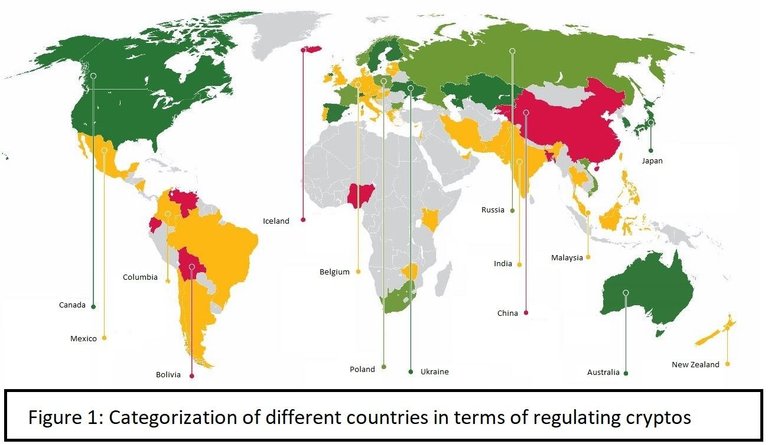Abstract
The cryptocurrencys is a novel phenomenon in the field of technology and economics and has many benefits.
Providing equitable and equal access to the global economy may be the most important. However, legislators are worried about the specific features of the currency code, because the risks to consumers and investors are the currency of the cryptocurrencies. In this paper, after a brief introduction to the categorization of different countries in the world in their approach to the cryptocurrencies, we examine the laws of the United States, Canada, China, Britain, the European Union, Japan, Russia and Australia.
In these studies, the nature of the cryptocurrencies, the large regulatory and the tax laws introduced.
Introduction
Historically, the speed with which new technology has been extended has always been less than the speed of its growth. (1) It is also a matter of blockchain technology and the amount of laws that have been laid down. Filling this legal vacuum requires a revolutionary movement, as blockchain technology itself has been a revolution in the realm of economics. In fact, numerous legislative sources have come to the conclusion that, in order to reach a broad consensus among financial institutions, it is necessary to establish rules and regulations for secure activities. (2)
At the moment of writing this article, more than 2,500 types of cryptocurrency have been introduced in cyberspace, which created a market of $ 500 billion. The market is being exchanged by about 10,000 electronic exchanges. Currently, some countries have banned the use of cryptocurrencies, and a small number of tax transactions have been made. Many central banks have issued warnings about the sharp fluctuations in prices and the lack of protection of customers' capital. The inevitable increase in regulatory and regulatory requirements in this area will increase the cost of transferring such currencies, but, on the other hand, will clarify the identity of the parties to the account. Cryptos may never get public acceptance. But blockchain's new technology is promising and future-proof. (3)
In the world we live in, 195 countries are legally recognized and recognized by the United Nations. These countries have taken one of the four following policies in the field of legalizing or illegalizing digital currencies.
The first category is the countries that consider digital currencies to be money and have defined those rules. Like Australia, Japan, and others, the second group considers digital currencies as assets and have been approved by that law. Like America. The third category has a legal vacuum, and virtually no currency is considered legal and not illegal. Such as Britain, Belgium, Brazil, Colombia, Chile, Croatia, Cyprus, Czech, Denmark, Estonia, Greece, Hong Kong, India, Indonesia, Ireland, the Zionist regime, Italy, Lithuania, Malaysia, Malta, New Zealand, Netherlands, Nicaragua, Pakistan, Philippines and Iran (4) (5). The fourth category for whatever reason has made the currencies illegal. Such as China (public sector), Iceland, Bangladesh, Ecuador, Kyrgyzstan, Thailand, Bolivia, Venezuela and Nigeria (5). Interestingly, among these countries, some consider mining or extraction as unrelated to Iceland (6).

A few months ago, on the 4th-6th of July 2017, at a conference on the modernization of world trade law, which was held under the auspices of the United Nations World Trade Organization Commission in Vienna. It has been argued that all digital currencies, although not included in the banking system, have all the conditions for modern commerce. (4) The intensity of the changes in this area is such that, in the report of the Commission on International Trade Law of the United Nations dated July 21, 2017, one of the duties In the future, the commission has defined the precise monitoring of the state of the blockchain-based technologies. (7)
References
(1): C, Chui, Cryptos for International Business Transactions - Prospects and Obstacles, Conference on the Modernization of World Trade Commission Rules. United Nations World Trade Law, Vienna, July 4 - 6, 2017
(2): A, Di Alfonso, The Future of Cryptos, Riverson University, 2016
(3): M, Shazpanski, Summary of the meeting of the European Parliamentary Research Committee, 2014
(4): D, Silva, Cryptos, International Regulation and Integration of Behaviors, Conference on the Modernization of World Trade Laws, United Nations World Trade Organization Rules, Vienna, 4 July-6 July 2017
(5): V, Lichota, Bitcoing's Regulatory: Global Effects, National Legislation, Joint Report by Forlag and Exxon, 2017
(6): Bitcoin Review, Blockchain and Initial Deliveries, Bison Mayson, 2017
(7): Fifth Report of the United Nations World Trade Organization, United Nations, 2017
Sorry for the grammatical errors, I am a bit in poor translation.
Continue the article in the posts later
Thanks
This is good information! I have a knack for reading through any grammar errors without noticing, so it probably wasn't too bad. Was this an article translation from somewhere or is it your original work?
Most of the translation is mine body, with a little help from my friend google ;)
Keep it up! :)
Classification of cryptocurrencies always seems to be a challenging and however centre point for regulators. Recently, Chetan Phull, the Canadian Bar Association (CBA) called on parliament to legalize cryptocurrencies as ‘money’.
Check out here: https://goo.gl/cY7PT1